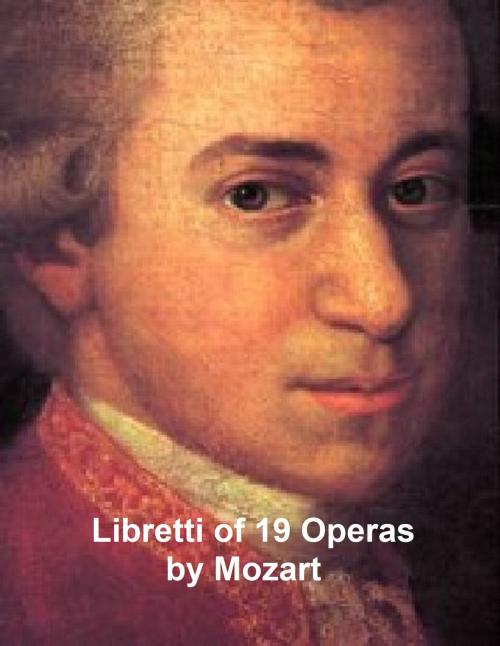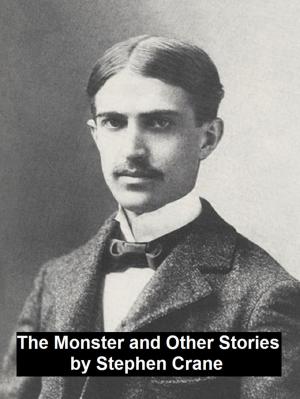Mozart: libretti of 19 operas
Nonfiction, Entertainment, Music, Music Styles, Classical & Opera, Opera| Author: | Wolfgang Amadeus Mozart | ISBN: | 9781455393206 |
| Publisher: | Seltzer Books | Publication: | December 4, 2017 |
| Imprint: | Language: | English |
| Author: | Wolfgang Amadeus Mozart |
| ISBN: | 9781455393206 |
| Publisher: | Seltzer Books |
| Publication: | December 4, 2017 |
| Imprint: | |
| Language: | English |
This file includes: Apollo et Hyacinthus (in Latin); Ascanio in Alba (in Italian); Bastien und Bastienne (in German); Cosi fan tutte (in Italian); Die Entführung aus dem Serail (in German); Die Gärtnerin aus Liebe (in German); Die Zauberfloete (in German); Don Giovanni o l'empio punito (in Italian); Idomeneo Re di Creta (in Italian); Il re pastore (in Italian); Il sogno di Scipione (in Italian); La Clemenza di Tito (in Italian); La finta semplice (in Italian); Le Nozze di Figaro (in Italian); Lo sposo deluso (in Italian); L'oca del Cairo (in Italian); Lucio Silla (in Italian); Mitridate, re di Ponto (in Italian); and Zaide (in German). According to Wikipedia: "Wolfgang Amadeus Mozart (27 January 1756 5 December 1791), was a prolific and influential composer of the Classical era. He composed over 600 works, many acknowledged as pinnacles of symphonic, concertante, chamber, piano, operatic, and choral music. He is among the most enduringly popular of classical composers. Mozart showed prodigious ability from his earliest childhood in Salzburg. Already competent on keyboard and violin, he composed from the age of five and performed before European royalty; at 17 he was engaged as a court musician in Salzburg, but grew restless and traveled in search of a better position, always composing abundantly. While visiting Vienna in 1781, he was dismissed from his Salzburg position. He chose to stay in the capital, where he achieved fame but little financial security. During his final years in Vienna, he composed many of his best-known symphonies, concertos, and operas, and the Requiem... His influence on subsequent Western art music is profound. Beethoven wrote his own early compositions in the shadow of Mozart, of whom Joseph Haydn wrote that "posterity will not see such a talent again in 100 years."
This file includes: Apollo et Hyacinthus (in Latin); Ascanio in Alba (in Italian); Bastien und Bastienne (in German); Cosi fan tutte (in Italian); Die Entführung aus dem Serail (in German); Die Gärtnerin aus Liebe (in German); Die Zauberfloete (in German); Don Giovanni o l'empio punito (in Italian); Idomeneo Re di Creta (in Italian); Il re pastore (in Italian); Il sogno di Scipione (in Italian); La Clemenza di Tito (in Italian); La finta semplice (in Italian); Le Nozze di Figaro (in Italian); Lo sposo deluso (in Italian); L'oca del Cairo (in Italian); Lucio Silla (in Italian); Mitridate, re di Ponto (in Italian); and Zaide (in German). According to Wikipedia: "Wolfgang Amadeus Mozart (27 January 1756 5 December 1791), was a prolific and influential composer of the Classical era. He composed over 600 works, many acknowledged as pinnacles of symphonic, concertante, chamber, piano, operatic, and choral music. He is among the most enduringly popular of classical composers. Mozart showed prodigious ability from his earliest childhood in Salzburg. Already competent on keyboard and violin, he composed from the age of five and performed before European royalty; at 17 he was engaged as a court musician in Salzburg, but grew restless and traveled in search of a better position, always composing abundantly. While visiting Vienna in 1781, he was dismissed from his Salzburg position. He chose to stay in the capital, where he achieved fame but little financial security. During his final years in Vienna, he composed many of his best-known symphonies, concertos, and operas, and the Requiem... His influence on subsequent Western art music is profound. Beethoven wrote his own early compositions in the shadow of Mozart, of whom Joseph Haydn wrote that "posterity will not see such a talent again in 100 years."















